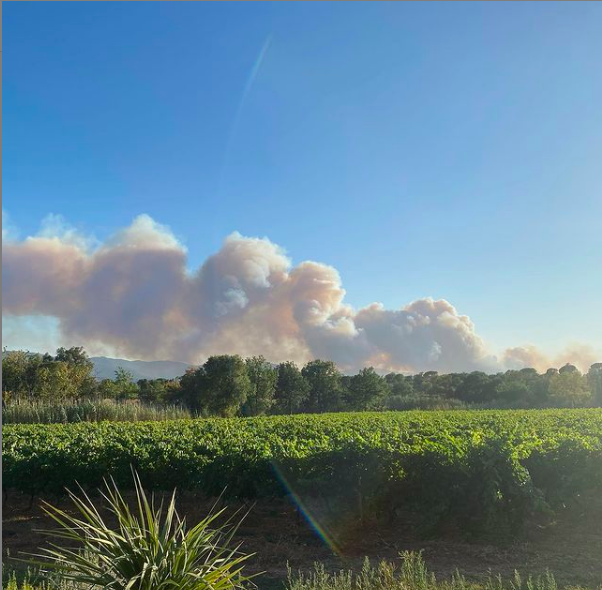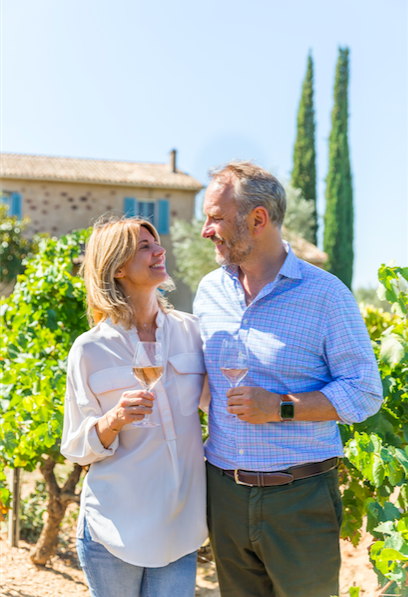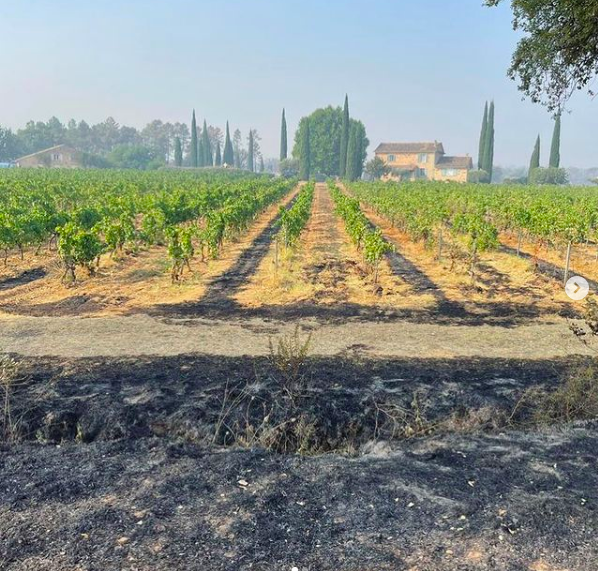This website uses cookies so that we can provide you with the best user experience possible. Cookie information is stored in your browser and performs functions such as recognising you when you return to our website and helping our team to understand which sections of the website you find most interesting and useful.
Stephen Cronk’s first-hand account of the Provence wildfire
In a searingly honest open letter, Stephen Cronk of Domaine Mirabeau opens up about the Provence wildfire that swept through his estate last week and speaks of the urgent need to act now to mitigate the effects of climate change.

The past few days have been heart-breaking to watch, as the devastation has unfolded over Provence with fires sweeping across 7,000 hectares of land and protected forest.
These forests are a crucial source of life, full of rich biodiversity, co-existing alongside human habitations in our busy and heavily populated area of the South of France. We have also been waiting in agony and praying for our Domaine Mirabeau and the vineyards of our colleagues and partners in the area, as all our life’s work is put at risk by the raging fires.
While we are still taking in the magnitude of what has happened, we hope this will serve as a further wakeup call that climate change means that these types of events will be more frequent and more devastating to all of us. Now more than ever we must look to how we will move forward to recover, but also do our best to prevent these from happening again. This year has been marked by many unprecedented climatic events all over the world and these reinforce the absolute urgency to act now.

Over the past few weeks we have witnessed the traumatic impact and devastation the forest fires across Europe have brought, which, apart from the impacts they have on the local ecosystems, accelerate global warming further with the double whammy of huge amounts of carbon in the atmosphere and lowering surfaces of CO2 sequestering vegetation. We really hope that when the smoke passes, the conversation about this life-threatening issue will continue.
It will be a long road, but we want to start again as soon as possible to rebuild the vegetation and biodiversity of our land to make a positive impact as farmers. Jeany and I will continue with our regenerative viticulture project, which we first started two years ago at Domaine Mirabeau and work to support our community of growers to do the same.
Collectively, the potential to make an impact is still enormous and this is not the moment to be disheartened. Growing more trees and other vegetation as part of a more diverse agriculture system will increase the surface for CO2 capturing plants and improve all important water retention in our region.
The impetus to start our own regenerative farming project came from listening to Oregon wine farmer and scientist Mimi Casteel, who co-founded the Regenerative Viticulture Foundation with myself and several notable others earlier this year. Her view on the situation and the importance of forests as part of our food systems is crystal clear:
“The objective must be extremely clear. Arresting and reversing climate change is a global objective. Our farms, our cities and towns, our deserts and oceans and remaining wildlands are all connected in time and space. Right now you know someone, or you are someone, who is going to be a climate refugee. We would recognise that perennial no-till agriculture alone cannot substitute for forest structure in restoring ecological balance.
“Trees are architecture, habitat, physical barrier, water pump, inoculum and so much more. Where the hydrological cycle has been most interrupted, we must map out targets for afforestation where it can do the most good in the least amount of time, and recruit the landowners that need to be a part of restoring hydrological integrity to their watersheds. We mustn’t see what has been lost, we must see what we can build again.

“We can recognise that fire is part of the cycle of resources in an ecosystem. Redistributing fuel is part of this puzzle of rebalancing the Earth. Where wildfires have burned forests to charcoal, the by-products of cleaning that up, and the products of thinning efforts to prevent wildfires should be put back on the depleted farms that border those forests, building soil, feeding microorganisms, and water holding capacity where it has been lost. This should be free to any farmer, including transportation and application”.
A vital conversation needs to be held about how forests can be managed better, without exposing these huge carbon capturing surfaces to being such an uncontrollable fire risk, where one catastrophic event will undo years of natural growth cycles.
Forests are complex ecosystems that have developed over millennia, but as sophisticated as they are from a biological perspective, their functional design is unable to cope with human-caused incidents, be they from a discarded cigarette-butt (most likely the case for us in Provence) or from a spark from an ill-placed barbeque.
In the Mediterranean region 95% of fires are caused by human carelessness and this is compounded by the hot and dry conditions that are becoming increasingly prevalent. Projects such as tree planting are futile if ongoing management of the forest and vegetation is not built in to protect these surfaces. As is stated by our friend and agronomy consultant Laurence Berlemont, intelligently managed agricultural surfaces can play a key role in fostering diversity, yet present an effective firebreak as part of a mixed agricultural and forestry system.
Since having acquired Domaine Mirabeau in 2019, we have already experienced two “once in a generation frosts” and pitifully low rainfall levels that have almost become the norm. Now we add the worst forest fires this region has seen in living memory. This is a stark reminder that climate change will irreparably damage our food systems and livelihoods and that putting off thinking about the macro picture is just no longer an option.
We are all citizens of this planet and stewards of the land and it is our collective responsibility to act now and do our best to prevent and protect further damage that generations to come will have to endure.

